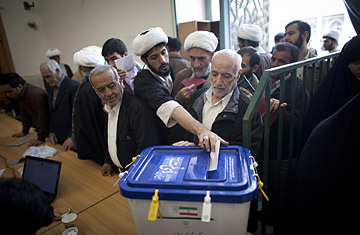
An Iranian clergyman casts his ballot in a polling station at the Massoumeh shrine on March 2, 2012 in Qom, Iran.
The polls opened at 8 a.m. on Friday morning for Iran's parliamentary elections and Supreme Leader Ayatullah Ali Khamenei showed up early to cast his vote. "There are a lot of verbal threats against the people of Iran, so the Iranian people have a more sensitive position in this round of elections," he said at the polling station. He continued, "A high turnout of the Iranian nation in elections will play an effective role in maintaining the country's security and prestige."
Khamenei was referring to external threats such as further economic sanctions, more international isolation or even a possible attack from Israel on the country's nuclear facilities. But the elections themselves also pose a threat for the regime: a showdown between the supporters of Khamenei and the supporters of president Mahmoud Ahmadinejad which could further destabilize the country. If Ahmadinejad and his supporters come out with a majority of the 290 seats in the majlis, or parliament, it could pave the way for one of the president's inner circle to run as a candidate in next year's key presidential elections. If Khamenei's supporters push through, then Ahmadinejad may not even be able to run out his term. The sitting parliament has summoned Ahmadinejad to appear for questioning by mid-March and could push for impeachment proceedings.
Some outside observers also claim that the results of these elections will hardly be free and fair. "Iranian authorities have stacked the deck by disqualifying candidates and arbitrarily jailing key members of the reform movement," Joe Stork, deputy Middle East director at Human Rights Watch, said in a statement. "There is no transparency surrounding the vetting and selection of candidates." Among those disqualified were some 600 supporters of Ahmadinejad, according to the Mashreq news site. While Khamenei stood by the embattled president after the 2009 elections, a bitter rivalry has developed between the two men which spilled out into the open last year. Now, their supporters openly criticize each other in the press and in parliament. The situation has reached such a boiling point that many of the candidates who support Ahmadinejad have chosen not to openly admit their allegiances for fear of disqualification.
Reports in the conservative press claimed that there had been a high turnout for the vote and the official voting hours were extended from 6 to 8 p.m. Witnesses say the polling stations in the working class southern portion of Tehran were quite busy while there was much less of a turnout in the affluent northern parts of the city. "I don't want to participate in this election because we don't have the right to choose our own representatives," says Soheila, who works for a government-run telecommunications office. "But I will vote. I'm afraid my national ID will be checked for a voting stamp and I can lose my job." Unlike the 2009 presidential elections, when the results of the poll were announced within hours after voting stations closed, the results of the parliamentary election are expected to be announced on either Sunday or Monday.
Noticeably absent this time are candidates from Iran's opposition, who have played a large role in past parliamentary elections. But after the contested 2009 presidential elections, which led to months of protests, many reformists called it quits. In fact, a leadership council for the opposition Green Movement asked their supporters to boycott the polls as a means of protest. Nevertheless, Khamenei and many of his supporters have tried to gloss over the divisions at the top and with the opposition. Throughout the vote on Friday, the semi-official Fars news site posted stories noting senior regime figures who had hit the ballot box. The list included Hassan Khomeini, grandson of the founder of the Islamic Republic Ayatullah Ruhollah Khomeini, and former president Mohammad Khatami, both of whom have expressed support for the opposition Green Movement in the past.
Despite the efforts to project an air of normalcy, the regime had prepared for the worst: earlier this week national police chief Ismail Ahmadi-Moqadam said that some 85,000 members of the Basij, a paramilitary group that strongly supports Khamenei, had been called up to ensure security. International journalists who had been allowed into the country to cover elections were kept under tight control and bused to polling stations on Friday, though other journalists based in Tehran had fewer restrictions in their reporting. Some members of the Basij were bused to a relatively empty polling station in central Tehran shortly before the arrival of foreign journalists, according to one Tehran resident who asked not to be identified because of the sensitivity of the subject. The Basij and other security forces will surely be on high alert once the results come out.
